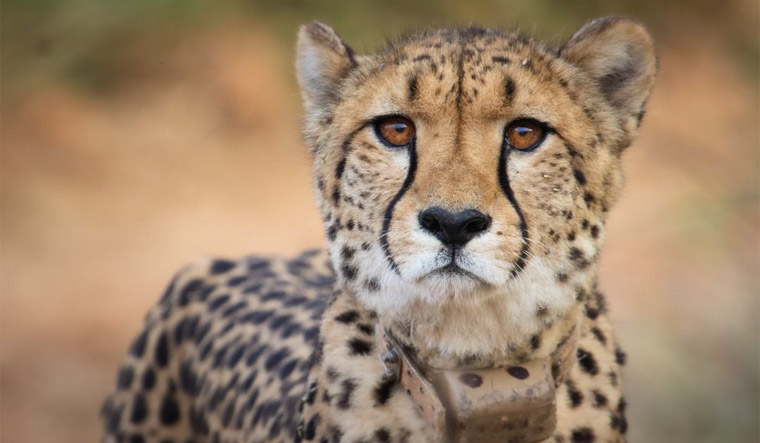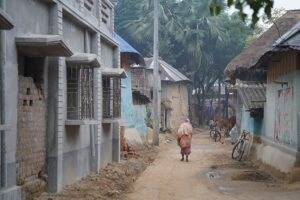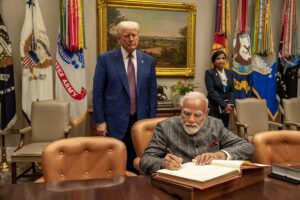Inadequate Space For Cheetahs In MP’s Kuno: Ex-WII Official

Cheetah Sasha was not keeping well since her arrival more than 6 months ago and died of a kidney ailment on March 27, 2023 (Image: PTI)
Source: PTI
Madhya Pradesh’s Kuno National Park (KNP), which has seen the death of two cheetahs in less than a month, has “inadequate space” for these felines brought from Africa, a former official of the Wildlife Institute of India has claimed.
The National Tiger Conservation Authority (NTCA), which is overseeing the ambitious cheetah reintroduction project in the country, has called a meeting in New Delhi on Monday in the wake of the death of two cheetahs out of the 20 felines translocated to KNP from Namibia and South Africa over the last eight months, an official said.
According to some experts, a cheetah needs about 100 square kilometre area for its movement. The KNP is spread over an area of 748 sq km and has a buffer zone of 487 sq km.
The Wildlife Institute of India’s (WII) former dean Yadvendradev Vikramsinh Jhala, who was part of the cheetah project in the past, told PTI that KNP has inadequate space for these animals.
“A 750 sq km area alone is not sufficient…We have to make (more than one) cheetah populations and manage it like a metapopulation where you move animals from one place to another. It is very essential to establish a second, third population,” he said.
“Kuno is a protected area, but the landscape in which cheetahs can live in Kuno is spread over 5,000 sq km, which includes agricultural parts, forested habitats, communities living within the area,” he said.
If the cheetahs adapt to this environment, they will be able to thrive in the KNP, he said.
“So, it all depends on how we manage the communities, ecotourism, giving them incentives, making sure that (human-animal) conflict levels are appropriately compensated if there are any,” Jhala said.
Asked about the population (theory), he said KNP is one site, Mukundara Hills Tiger Reserve (in Rajasthan) is another site, Gandhi Sagar Sanctuary and Nauradehi Wildlife Sanctuary in MP are two other sites.
Each of these sites in itself is not viable. To shift one or three cheetahs after one, two generations from here to there is called metapopulation management so that there is genetic exchange. This is an important exercise. Without this, we can’t manage cheetahs in our country, he said.
“Without this, we can’t have viability in the long run,” Jhala added.
One of the eight Namibian cheetahs brought to KNP, Sasha, aged more than four-and-a-half-years, died of a kidney ailment at the park on March 27.
The KNP witnessed a second cheetah fatality in less than a month as a six-year-old male feline named Uday, translocated from South Africa in February, died on April 23.
Another cheetah, named Siyaya, recently gave birth to four cubs in KNP.
Besides, cheetah Pavan, has strayed out of the KNP multiple times, while cheetah Asha has wandered out of the park twice.
Earlier this month, the MP forest department wrote a letter to the NTCA seeking an alternate site for the translocated cheetahs.
“We have sent a request letter by official mail to the NTCA….They have not replied yet,” a forest official told PTI on Saturday on condition of anonymity. “We can’t release all the 18 cheetahs into the wild in KNP,” he said, while citing lack of logistical support and space for the felines.
Notably, months before the cheetahs were brought to India from Africa, a risk management plan was drafted stating a contingency plan is in the process of being put in place for dealing with serial escapees. Permissions are being obtained for the release of these animals into the Mukundara Hills Tiger Reserve.
This protected area has an 80 km fence enclosure, sufficiently stocked with game (place with herbivores population), to hold serial escapees. This enclosure is free of tigers, but does support a low density of leopards, wolves and striped hyenas, it said.
“It can be considered a guaranteed success site for the establishment of a wild cheetah population and will hopefully provide surplus cheetahs for relocation to other protected areas in India in near future,” the risk management plan stated.
An MP forest official said it is not a matter between two states.
“The Centre has a major role to play. We need a note from the Centre to proceed. We desperately need an intervention from the Centre. If they don’t take the decision, it will be detrimental to the interest of the cheetah project,” the official said.
If we start developing our sites like the Gandhi Sagar Sanctuary or the Nauradehi Wildlife Sanctuary in MP as alternate sites, it will take two and three years respectively, he said.
The cheetahs from the two African nations have been brought to India under the ambitious inter-continental translocation programme to revive their population in the country seven decades after they became extinct.
The country’s last cheetah died in Koriya district of present-day Chhattisgarh in 1947 and the species was declared extinct in 1952.





